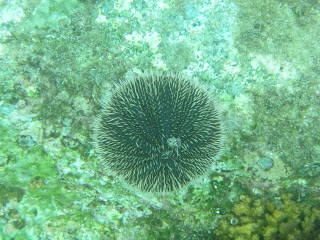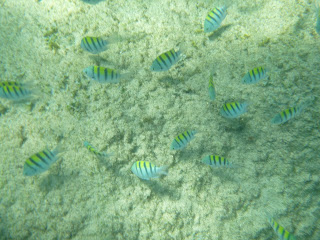 |
| Pacific sunset after leaving Bahia Tortugas. |
We left Bahia Tortugas a little after 2:00 pm for
another overnight passage on our way to Bahia Magdalena. The winds varied throughout the afternoon and
into the night allowing us to sail at times while other times it was necessary
to motor in order to put some miles under the keel. I had made a chicken stew which basically
consisted of opening the refrigerator and cutting up everything in sight and
adding it to a pot with some cut up chicken.
I hate to let anything go to waste on the boat, especially fresh
vegetables since they can oftentimes be hard to find. I have been in the habit of making a large
pot of something right before we leave on overnight passages as it is far
easier to heat up something pre-made than to try and cook a meal while at
sea.
 |
Night watches can be very dark.
|
For those of you who are interested, when Richard
and I are on multi-day, overnight passages, we adhere to a watch schedule of
three hours on and three hours off. I
take the midnight to 3:00 am, 6:00 am to 9:00 am, noon to 3:00 pm, and 6:00 pm
to 9:00 pm watches and Richard takes the watches in between. This schedule worked for us when we sailed to
and from Hawai'i back in the summer of 2010 so we decided to stick with it on this trip. That doesn’t mean that if it doesn’t seem to
work at some point that we won’t change it, but at this point in time, it seems
to work pretty well for us.
 |
| A welcomed sunrise off the Pacific Coast of Mexico. |
I am a total grazer when we
are on long passages. I will have my
breakfast, usually oatmeal (instant is sooo much easier than stovetop) or
cereal at the beginning of my 6:00 am to 9:00 am watch, along with a small
glass of juice, to wash down the vitamins, and black tea. Then, when Richard relieves me at 9:00 am, he
usually heats up some banana bread (or whatever breakfast bread we have on
board…Richard is a great baker!) and I eat that before doing my off-watch
chores. I usually make lunch right
before my noon to 3:00 pm watch and lunches are usually sandwiches, chips,
fruit, if we have it, and cookies. Right
before my watch ends, I usually eat an apple or some nuts/trail mix (I love wasabi peas and cashews!). Dinner is heated up and served before it gets
dark, so usually around 5:30 pm right now.
My watch starts at 6:00 pm and I usually allow myself one piece of
chocolate per hour of watch on this watch and my midnight to 3:00 am
watch. Currently we are indulging in a
selection of Seattle Chocolates and Godiva Gems, provided to us
by our friends Matt and Julia…thanks guys!, along with some Dove Dark Chocolate. At sunrise when my 6:00 am to 9:00 am watch
starts, I just repeat the whole thing over again. Oddly enough, actually, luckily, I haven’t
gained any weight despite Richard insisting that I am eating way too much
chocolate (ask my mother, eating too much chocolate is IMPOSSIBLE when it’s
good chocolate, and life is too short to eat anything but good chocolate).
 |
This skipjack tuna wasn't very tasty,
but made pretty good bait. |
So you might be wondering what we do when we are
off-watch? Well, every time you get off
of a watch, you have to log specific information into an off-shore log book
that we put together. A lot of the
information contained on the log is really reminders to check the various
systems to ensure that things that should be off are off (like the gas for the
stove, water pressure, inverters, etc.), water isn’t building up in the bilge,
and to record certain weather conditions (wind speed/direction, barometric
pressure, and cloud cover), as well as trip information (course, speed, total
miles during period, etc.). Oh yea, and
after all that is done, you usually try to sleep. Sleep comes in less than three hour blocks;
each watch equals three hours so your sleep time equals three hours minus the
amount of time needed to complete all of your off-watch chores. You also have to find time to bathe, brush
your teeth, change clothes every now and then, fish, blog, clean the cabin,
repair stuff…the list goes on and on. On
the small overnight passages, meaning about two to three overnights in the
passage, this can result in significant fatigue as your body needs some time to
get used to this new circadian rhythm.
But on the longer passages, after four or more overnights, your body
gets used to the schedule and as a result you tend to feel less tired. Then again, everyone is different when it
comes to adjusting to these kinds of schedules, this is just how I have
experienced it.
 |
| View of mast with deployed headsail on left. |
We arrived at Bahia Magdalena late afternoon on
December 11th. We were tired
from the overnights we had just finished so we pretty much just stayed on the
boat and tried to decompress. A panga
came by and asked if we had any trash (basura)
that we wanted toted off of the boat and we informed him that we didn’t have
any today but perhaps mañana. The panga driver then wanted to know if we
had any t-shirts for him. This becomes
awkward, more for us than for the one asking.
Here we are in an expensive yacht, flying the American flag, with
digital cameras, cell phones, iPods, laptops, and oodles of other stuff that
just reek of conspicuous consumption.
And here’s this guy in a panga in rural Mexico, who comparatively has
very little. It’s a situation that every
cruiser must face at one point in his/her travels and how you handle these
types of situations is very personal.
As a cruiser, I can’t be expected to clothe the world or give something
to every person who asks for something.
It’s just not feasible. On the
other hand, I understand that I am very fortunate and that comparatively I do
have more than my fair share. So what do
you do? My solution is to know who and
how I want to help. I will always pay
some nominal amount of money to someone who approaches my boat in his/her
dinghy and who wants to offload my trash for me.
 |
| Fishing village in Bahia Magdalena. |
Generally speaking, I will pay for any
services that I need; and I’m not talking about regular services like you get
at a store or mechanic, I’m talking about unsolicited services; those services
that you weren’t thinking about until someone cruised on over and asked “Hey,
can I take your garbage to shore for you?”
I have also decided that the way that I want to help out in the world as
I travel about in it is to supply school supplies (pencils, erasers, pens,
small notebooks for students and spiral bound notebooks for teachers, etc.) in
those areas that most need these types of supplies. In addition, Richard and I have decided to
stock our boat with toothbrushes and small tubes of toothpaste to distribute,
again in rural areas that are possibly dependent on supply ships that have long
periods of time between visits. I am
also carrying balloons for kids, and Richard stocked up on razors for men, and
I have “hotel toiletries” to distribute to the women, in addition to
monofilament and fishing hooks for the men.
You do what you can and have to understand that you can’t help everyone
and that this is not the purpose of your trip.
If the opportunity arises, I will help build a school, clinic, library
or other such long-lasting infrastructure that goes way beyond supplying any
one individual with a t-shirt. Not that
the panga guy who asked for a t-shirt was wrong in asking; he wasn’t and he
should ask if he needs a t-shirt.
Someone will supply that t-shirt; karma works that way.
 |
| Sunset in Bahia Magdalena. |
We ended up spending
three nights in Bahia Magdalena. On the
day after we arrived, Richard and I took the dinghy to shore and proceeded to
report to the harbor master’s office as it is required that all cruisers who
enter a port that has a harbor master must report their arrival. When we got to his office, he wasn’t there so
Richard took out his Spanish/English dictionary and a piece of paper and
documented our arrival. After we had
dispatched with the formalities, we walked around the town of Puerto
Magdalena. At the time we did not know
that it was an “optional” holiday in Mexico being the Feast of Guadalupe. That
night, as we sat on the boat having dinner, we heard traditional Mexican
singing coming from shore. We surmised
that the town must be celebrating the holiday and doing so in song. It was really cool to sit on the boat and
listen to this music float over to us from shore. With a better command of Spanish, we might
have attempted to join in on the celebration, but with our limited
comprehension of the language it might have just seemed intrusive so we enjoyed
it from afar and it was wonderful just the same.













































